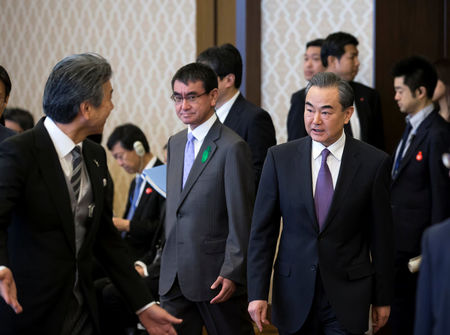 © Reuters. Taro Kono, Japan’s foreign minister, and Wang Yi, China’s foreign minister, arrive for a high-level Japan-China economic dialogue in Tokyo
© Reuters. Taro Kono, Japan’s foreign minister, and Wang Yi, China’s foreign minister, arrive for a high-level Japan-China economic dialogue in TokyoTOKYO (Reuters) – Japan and China agree that a trade war will have serious consequences for the world economy, Japanese Foreign Minister Taro Kono said on Monday after a high-level economic dialogue between the world’s third- and second-largest economies.
Concern is growing about a trade row between China and the United States in which the two nations have threatened each other with tariffs. Japan has been criticized by U.S. President Donald Trump on trade and been hit with tariffs on steel and aluminum, but it has not yet threatened counter-tariffs.
“We have shared understanding that a trade war, no matter which country has brought it about, would have a very large impact on the prosperity of the international economy,” Kono told reporters after the first such dialogue in more than seven years.
Kono and the Chinese government’s top diplomat, State Councillor Wang Yi, co-chaired the Tokyo meeting. Wang is also foreign minister.
Financial markets have been roiled recently over fears that a full-blown U.S.-China trade war could shatter global trade and economic growth.
Trade issues will likely be at the forefront of a summit between Japan’s Prime Minister Shinzo Abe and President Trump later this week. Tokyo is eager to avoid being pushed into talks on a two-way free trade agreement aimed not only at market access but at monetary and currency policies.
Kono also said it was possible that Japan works with China on Beijing’s Belt and Road projects.
“It is quite possible that Japan cooperates with China on various (Belt and Road) projects on a case by case basis where international standards are met,” Kono said.
Chinese President Xi Jinping’s Belt and Road Initiative, unveiled in 2013, aims at building a modern-day Silk Road connecting China by land and sea to Southeast Asia, Central Asia, the Middle East, Europe and Africa.
Abe and Xi pledged last year to reset the sometimes touchy relationship between Asia’s two largest economic powers.
Wang, who spent eight years in Japan as a diplomat including three as ambassador, said the changing economic climate presented fresh opportunities.
“After reopening these talks, we’re both standing at new starting points to discuss future cooperation that will, I hope, lead to fresh economic growth for both nations,” Wang said at the start of the economic dialogue.
Wang is the first Chinese foreign minister to visit Japan in a bilateral context in nine years. He and Kono discussed a broad range of issues, including North Korea, on Sunday night.
Fusion Media or anyone involved with Fusion Media will not accept any liability for loss or damage as a result of reliance on the information including data, quotes, charts and buy/sell signals contained within this website. Please be fully informed regarding the risks and costs associated with trading the financial markets, it is one of the riskiest investment forms possible.
Source: Investing.com


























